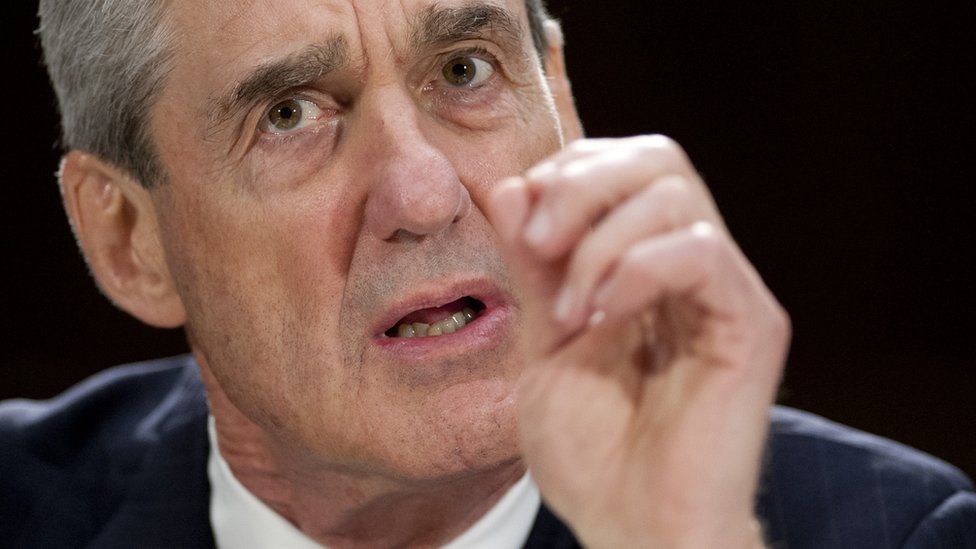Special counsel: What is it and what did Robert Mueller investigate?
- Published

The special counsel was put in place to oversee the investigation looking into alleged Russian interference in the US presidential election, and if Trump campaign figures were complicit.
Robert Mueller, who headed the FBI for more than a decade, was appointed in May 2017. He concluded his inquiry nearly two years later.
But what is a special counsel? And what powers does he have?
Why was he appointed?
The special counsel was appointed by Rod Rosenstein, the deputy attorney general. He made the decision as "acting attorney general" because Attorney General Jeff Sessions had stepped aside from the Russia inquiry.
Mr Rosenstein said that given the "unique circumstances", it was in the public interest for a special counsel independent "from the normal chain of command", to lead the investigation.
By placing authority for the probe into the hands of Mr Mueller, the idea was that it would be able to proceed without any interference, including from the White House.
What was he looking at?
Mr Rosenstein's order allowed Mr Mueller to look into:
- The Russian government's efforts to interfere in the election
- Any links or co-ordination between Russia and Trump campaign-linked individuals
- Any matters that arose or may arise directly from the investigation
His investigation ventured into work done by former Trump advisers and Russian nationals. Thirty-four people have been charged with wrongdoing.
What did he find?
Mr Mueller's 448-page report said it had not established that the Trump campaign criminally conspired with Russia to influence the election.
However, it did detail 10 instances where Mr Trump had possibly attempted to impede the investigation and stated the report did not exonerate Mr Trump.
Mr Mueller reiterated that in a rare statement following the end of the inquiry and said legal guidelines prevent the indictment of a sitting president. He said if his team had had confidence that Mr Trump "clearly did not commit a crime, we would have said so".
Read more
Why is he testifying now?
After weeks of negotiations with lawmakers over his appearance, Mr Mueller will face two House of Representatives hearings on 24 July, where lawmakers are expected to question him on obstruction of justice and collusion.
Democrats will probably focus on laying out whether the president could be charged with obstruction; Republicans may instead question the process of the investigation and ask about biases against the president.
The special counsel has said his report is his testimony and that he will not speak about anything not included in the report.
What powers does a special counsel have?
The special counsel has the powers of a US attorney - meaning he can subpoena records and bring criminal charges. And Mr Mueller did so.
He can also prosecute anyone who interferes in his investigation through crimes including perjury, obstruction of justice, destruction of evidence, and intimidation of witnesses.
The special counsel can also ask for his jurisdiction to be widened, and is not supervised on a day-to-day basis.
But the attorney general may request an explanation for "any investigative or prosecutorial step" and can decide that any such action does not need to proceed - though he must notify Congress if such a decision is made.
Who works for him?
The justice department provided staff, and the special counsel can also ask for specific people from both inside and outside the department.
Mr Mueller had reportedly hired at least 17 federal prosecutors, including experts in money laundering, fraud, foreign bribery and organised crime.
Who can get rid of a special counsel?
The attorney general. Bill Barr is currently in the role, having replaced Jeff Sessions after the former Alabama senator was fired.
Mr Barr can fire a special counsel for the following reasons: misconduct, dereliction of duty, incapacity, conflict of interest or for other "good cause", including violation of department policies.
Will the public get to read the full report?
Not necessarily, though Democrats have been calling for the full report to be made public. Currently, about 10% of the report has been redacted from the public version.
The House Judiciary Committee recently negotiated a deal with the Department of Justice to review some of the underlying evidence from the report in exchange for not holding the attorney general in contempt.
What to expect from Mueller hearings
What's the difference between a special counsel and a special prosecutor?
The term "special prosecutor'" in the US context harks back to the Watergate scandal, when President Nixon's attorney general appointed Archibald Cox to lead an independent investigation.
But there was actually no law defining and regulating such an appointment, which allowed Mr Nixon to later fire Mr Cox. Only later, in 1978, was the Ethics in Government Act passed, which defined the circumstances under which an "independent counsel" could be appointed.
This role actually had more independence from the attorney general than the current special counsel position.
But the legal provision regulating it was allowed to expire in 1999 after the controversy of independent counsel Kenneth Starr's wide-ranging investigation into President Bill Clinton, which started as an inquiry into the Whitewater land deal allegations but ended up providing details of his sexual relationship with White House intern Monica Lewinsky.
So the titles "independent counsel" or "special prosecutor" no longer exist.
Instead the justice department has regulations allowing an outside "special counsel" to be appointed to investigate a person or matter when it might present a conflict of interest for the department or under other "extraordinary circumstances".
- Published24 July 2019
- Published25 March 2019
- Published16 February 2018